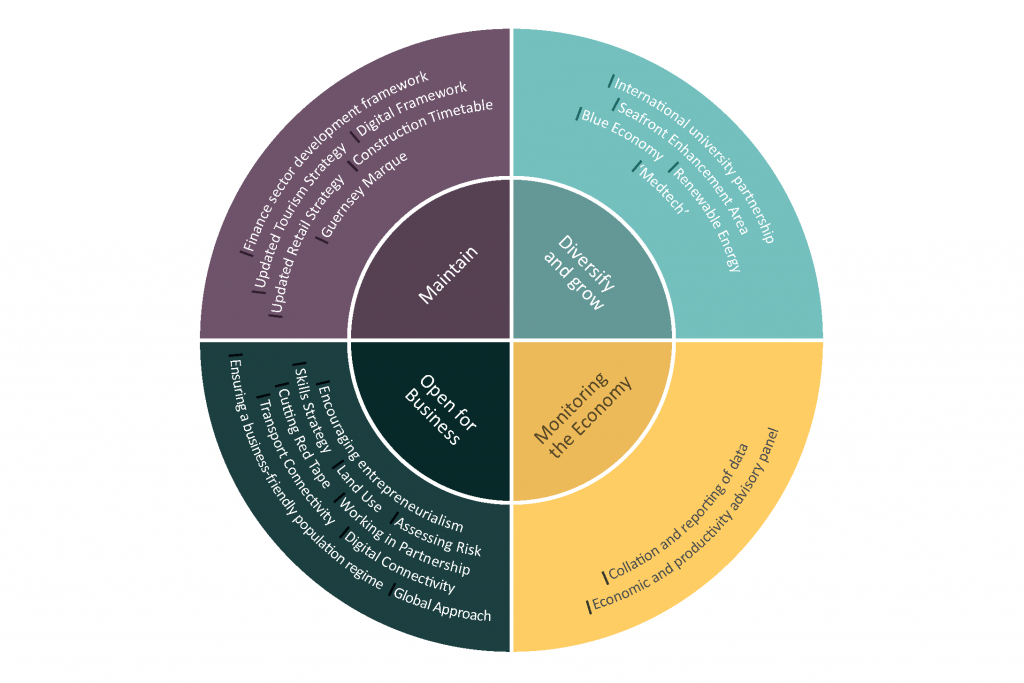At the end of the most recent States assembly session, Guernsey’s key economic development committee unveiled its long-awaited strategy document. Actually it was a two-page summary, and presumably a more detailed version of the “20 action points to promote stronger growth” will be debated in due course.
Although it was also overshadowed by the outcome of the assisted dying debate, the summary was soon spread over the broadcast and press media, and Deputy Charles Parkinson, the committee head, spoke about it a week later. “These are just ideas,” he was reported to have said. “There is no commitment to do them.”
The biggest disappointment about the document is that the 20 actions are not listed in a particular order. Deputy Parkinson says the document is “starting a conversation.” But his committee’s thinking about the relative importance of its 20 points would have helpfully kick-started such discussions.
In that spirit, here is a first-impulse reaction. The table below displays the original non-order and some basic observations. Happily, the number of overlaps among the 20 mean that the original list could be shorter. It shows:
— Four evident priorities for economic growth – two in the short-term (air and sea links, population management), one for the medium-term (telecoms/digital framework) and one for the long-term (seaboard development).
— The observations about key economic sectors (finance, tourism, construction, telecoms, retail) are somewhat well-worn.
— Measures such as skills development and cuts in red tape are obvious “supply side” imperatives, many of which are the subjects of action or have long required it.
— There are some novelties which require research, such as the “blue economy,” “medtech” and “an international university presence.” And a couple which require re-interpretation in order not to be meaningless.
| Original description | Observations | |
|---|---|---|
| 1 | Strengthen air and sea links | Short-term high priority. Now a systemic issue. Key question: monopoly or competition? |
| 2 | Enable finance sector growth and diversification | An issue for 20+ years amid awkward relations between industry, regulator and government |
| 3 | Support innovative businesses and products | Under way in disparate fashion – Guernsey Investment Fund, Start-Up Guernsey, Digital Greenhouse. |
| 4 | Prioritise seafront enhancement area work | Long-term high priority. Public support required. Helps revitalise local economy (see 7). Adds infrastructure. |
| 5 | Develop a plan for investing in Guernsey’s tourism product | VisitGuernsey surely has a plan. Yet tourism is in trouble: hotel stock problematic, attractions under-developed |
| 6 | Updated retail strategy | Strategy has been under discussion for several years already. Planning issues a particular problem. |
| 7 | Establish pipeline of construction opportunities and develop construction skills | Obvious growth driver. Links with seafront plan, Bridge+Admiral Park developments and hotel possibilities |
| 8 | Implement a long-term skills development plan | Years-long attempts to implement such plans remain just that – attempts. Can Education and EconDevlpmt work together? |
| 9 | Ensure population management policy is flexible and supports skills needs | Cornerstone issue for island’s future. Links with 11. How many people is too many? |
| 10 | Put in place framework to foster entrepreneurialism | Who can possibly disagree? Must involve various business bodies. Links also with 3 and 19. |
| 11 | Ensure Open Market is attractive to HNWIs | Links with 9. Aim for individuals with businesses. |
| 12 | Continue to develop and implement the digital framework | Links with 17 and critical to island future. |
| 13 | Establish an international university presence in Guernsey | Talks under way to integrate GTA+CFE+HSCStudies. Smaller-scale specialist tertiary institution an option. But add a university? |
| 14 | Develop plans for the blue economy | A potpourri of items 4, 5 and 15, impossible to define. |
| 15 | Develop plans for renewable energy as part of energy policy | Can we compete with rest of world on this front? Simplest non-oil route is to buy French N-power. |
| 16 | Develop clinical and medical services ‘medtech’ plan | Our unique advantage here is obscure. |
| 17 | Implement telecoms sector strategy | No disagreement. See 12. |
| 18 | Identify and remove red tape to boost competitiveness and reduce costs of doing business | The unmet ambition that every government claims to seek. Should be part of culture |
| 19 | Develop clear jurisdiction-wide economic risk appetite | Seems meaningless unless perhaps targeted at conservatism of GFSC |
| 20 | Work to develop new markets and consolidate existing markets | Surely already being done via Guernsey Finance, Visit Guernsey, Locate Guernsey (which together = Promote Guernsey). Needs to be done much better |
Footnotes:
- The strategy document is the work of a committee formed only a few months earlier. The previous committee broke up when its head resigned in late 2017. The man hired earlier that year as the department’s chief civil servant and economic adviser also stepped down. That team had just completed a more detailed but somewhat grey 33-page “vision” document. Deputy Parkinson withdrew it, saying it lacked vision and needed “tweaking”.
- A textual comparison of the two documents shows similarities but also differences. The new document includes references to a university and to “medtech,” but none to egaming. The earlier document offers clearer priorities. It also refers to funding, a timetable and Brexit. The politics surrounding the two is also different. According to the new team the first document was presented as a take-it-or-leave-it plan. This document ostensibly seeks broader buy-in after fuller debate.
- The 20 action points invite comparison with the 23 investment priorities already listed as part of the island’s separate policy and resource plan. The overlap is notable in respect of air and sea links, seafront development and digital connectivity. The scope is different – the plan embraces budgeting, education, health care, social welfare, housing. It is hard to escape the view that policy coordination remains a problem for this States.







